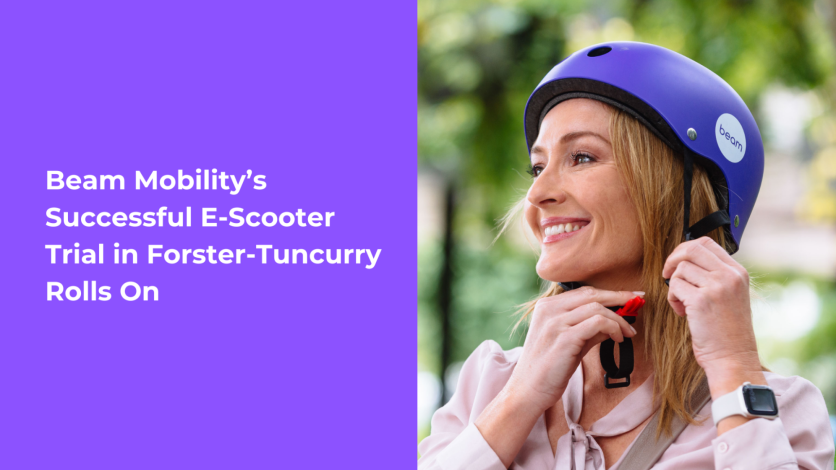
Shared micromobility is often associated with large urban cities—dense landscapes with traffic congestion challenges—with smaller communities seeming less likely to benefit from the rise of micromobility.
However, Beam's recent shared e-scooter trial in Forster-Tuncurry, a pair of small coastal towns in New South Wales, has shown again that e-scooters aren't just for cities. Regional towns can also experience profound changes in the modal shift towards eco-friendly e-scooters.
First launched in December 2023, overseeing council MidCoast Council recently voted to extend Beam's shared e-scooter trial through to June 2025. It's clear that the success of the program is having a lasting impact—not just on the towns' mobility landscape but on their environmental footprint. In just 12 months, rider data has shown its potential to reshape how the local community moves, reduce car dependence, and bridge transport gaps for both residents and visitors to the town.
The numbers tell the story.
Since launching the shared micromobility trial in December 2023, Forster-Tuncurry residents have embraced shared e-scooters with enthusiasm. To date, Beam has facilitated over 67,000 trips, with riders covering a total of 136,000 kilometres.
But the numbers go beyond just ridership. One of the most significant findings from the trial is the strong modal shift away from car usage. Half of Beam users in Forster-Tuncurry report that they would have driven a car if e-scooters were not available, highlighting the vital role shared micromobility plays in reducing car dependency in even small towns. Additionally, 52% of those who own cars have reported using them less frequently, opting for the eco-friendly, convenient e-scooter alternative instead. This shift in travel behavior demonstrates the potential of micromobility to reshape how people move, even in a region where car-centric transport has long been the norm.
In addition, shared micromobility has shown its ability to support local businesses and stimulate the local economy in Forster-Tuncurry, with 7 out of 10 Beam trips involving a purchase at a local business, and 39% of Beam riders in Forster-Tuncurry utilising shared e-scooters to visit shops and local businesses.
The success of the Forster-Tuncurry trial is also rooted in Beam's commitment to safety and responsible use. Technology integrated into Beam's shared e-scooters plays a critical role in monitoring and enforcing safe behavior on the e-scooters, and Beam's local marshals patrol the streets, educating riders and ensuring compliance with safety protocols. Fewer than 1 out of 100,000 Beam trips end in a reported serious incident, with Beam continually introducing new safety features and in-app rider education campaigns to educate riders on the riding laws and proper riding etiquette.
Looking Ahead
The ongoing success of Forster-Tuncurry's shared micromobility trial offers valuable insights for other regional towns and cities seeking new and innovative ways to support the local economy, stimulate tourism, support public transport connectivity, and decrease car congestion.
As the trial continues through 2025, Beam will continue to share data with the MidCoast Council, helping to assess not only the uptake of e-scooters in Forster-Tuncurry but also where and how people are using them. This data will be critical in fine-tuning future policies and services, ensuring that micromobility can evolve in a way that best serves the needs of the community.
The success of this program to date shows that shared micromobility is a benefit to communities of all sizes. Whether it's for reducing car dependency, improving local mobility, or simply providing an alternative to the status quo, the future of transportation in small towns looks brighter than ever.
ⓒ 2025 TECHTIMES.com All rights reserved. Do not reproduce without permission.




